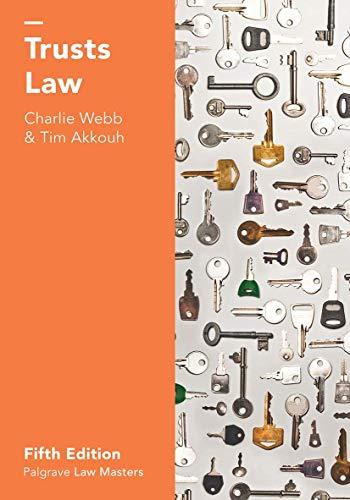Question
1 Identifying appropriate remedies What remedies are most appropriate in the following situations and what would be their effect? What needs to be established for
1 Identifying appropriate remedies
What remedies are most appropriate in the following situations and what would be their effect? What needs to be established for the remedy to lie?
(a) You suspect and have some evidence suggesting that the Departmental officer who has made the decision refusing to renew your driver's licence does not have the authority to make such decisions.
(b) You are seeking to send your child to a public school out of your catchment area and need government approval. You have filed the application, but have not received an answer for over 7 months and the school term is approaching. You are told the Department will not be making a decision in your case, arguing it has a discretion not to determine the issue.
(c) Your favourite tree in your neighbourhood happens to be a native Scribbly Gum in your neighbour's backyard. You are given a notice that council has given approval for the tree to be removed, ahead of major renovations. You think the decision is wrong.
2 Standing
Read Onus v Alcoa (1981) 149 CLR 27, 30-39, 64-68, and Australian Law Reform Commission, Connection to Country: Review of the Native Title Act 1993 (Cth) (Report No 126, April 2015) 211-20, and answer the following questions. (Do not rely on the extracts found in Creyke et al, Control of Government Action (LexisNexis Butterworths, 6th ed, 2022).
(a) What are the facts and procedural history of this case?
(b) What two submissions did Lorraine Sandra Onus and Christina Isabel Frankland make in support of their argument that they had standing?
(c) Was Gibbs CJ convinced by Onus and Frankland's arguments? Why? Why not?
(d) What policy considerations underpin the test of standing they apply?
(e) What relevance (if any) might the Australian Law Reform Commission's observations about 'proof and evidence' in the context of Native Title Act 1993 (Cth) have for standing case law?
3 Sugar-Free Television
In 2018, the Commonwealth Government introduces the Sugar-Free Television Act 2018 (Cth), the effect of which is to ban television advertising of a range of products deemed to contain excessive amounts of sugar. Proscribed products include soft drinks and lollies.
The Act affords the Minister for Health discretion to approve an advertisement that 'adequately warns of the health risks' associated with consumption of products governed by the Act. The relevant Act does nothing to exclude the application of the ADJR Act.
Billy Wonka Inc is a confectionary manufacturer. They want to show a television advertisement which suggests science has not yet established a link between excessive sugar consumption and adverse health impacts. In May 2018, the Minister grants the permit.
A number of parties are upset by the Minister's decision: Aches and Pains Ltd (a major health fund), Tara Bilson (author of a book called 'Give Up Sugar'), and Mums Against Lollies (a group dedicated to eliminating sugary treats for children).
(a) Advise all three parties if they will have standing to seek judicial review of the Minister's decision.
(b) If a party does not have standing, what other options are available for him/her/it to participate in judicial review proceedings?
Step by Step Solution
There are 3 Steps involved in it
Step: 1

Get Instant Access to Expert-Tailored Solutions
See step-by-step solutions with expert insights and AI powered tools for academic success
Step: 2

Step: 3

Ace Your Homework with AI
Get the answers you need in no time with our AI-driven, step-by-step assistance
Get Started


